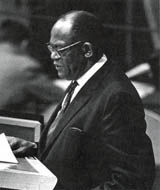Classic DACB Collection
All articles created or submitted in the first twenty years of the project, from 1995 to 2015.Matthews, Zachariah Keodirelang (B)

Zachariah Keodirelang Matthews (Kimberley, South Africa, 1901-Washington, D.C., November 5, 1968) was a scholar, politician, and diplomat.
A miner’s son, he was educated at Lovedale High School in South Africa. He was the first African to graduate from the University of Fort Hare and the first African in South Africa to graduate as a lawyer. In 1925 he became Principal of the high school at Adams College in Natal. In 1933 he studied at Yale University in the United States, where he received his M.A. He then went to the London School of Economics, where he studied anthropology under the renowned Professor Malinowski. In London, he met many future African leaders including Kwame Nkrumah of Ghana, Azikiwe of Nigeria and Kenyatta of Kenya.
In 1935 he returned to South Africa and campaigned against removing African voters from the voting rolls in Cape Province. He helped organize the All African Convention held in Bloemfontein in 1935. The following year he became head of the African Studies department at Fort Hare. He was elected in 1940 to the Native Representative Council, resigning in 1950 in protest against the government’s policies. In 1949, he was elected President of the African National Congress for the Cape.
In 1952, he became Henry Luce Professor of World Christianity at Union Theological Seminary in New York.
In 1956, while Acting Principal of Fort Hare University, he was arrested and charged with high treason, and held until the charge was dropped in 1958. In 1960, he was again arrested under the State of Emergency regulations, but was released six months later. He later went to Geneva as one of the secretaries of the World Council of Churches.
In 1966, when Botswana became independent, he was appointed Botswana’s Ambassador to the U.N., a post he held until his death in 1968. His body was taken back to Gabarone, Botswana, for burial.
Z.K. Matthews was a remarkable man, not only for his intelligence, energy and leadership, but by virtue of the bridging role he played between the “old guard” African leadership, considered strongly conservative by many in the 1940s and 1950s, and the “Young Turks” such as the founders of the Youth League, who sought a strong Afrocentric voice with which to speak for liberation.
Keith Irvine
Bibliography
Ronald Segal, Political Africa, New York: Praeger, 1961.
Additional sources on Matthews, Z.K.:
- N.a. “Zachariah Keodirelang Matthews,” South African History Online, 2011. https://www.sahistory.org.za/people/zachariah-keodirelang-matthews (Accessed 23 August 2023).
- N.a. “Z.K. Matthews,” The UNISA History and Memory Project, n.d. https://www.unisa.ac.za/sites/corporate/default/Unisa-History-and-Memory-Project/Personalities/All-personalities/Z.K.-Matthews (Accessed 23 August 2023).
This article was reprinted from The Encyclopaedia Africana Dictionary of African Biography (In 20 Volumes). Volume Three: South Africa- Botswana-Lesotho-eswatini. Ed. Keith Irvine. Algonac, Michigan: Reference Publications Inc., 1995. All rights reserved.



